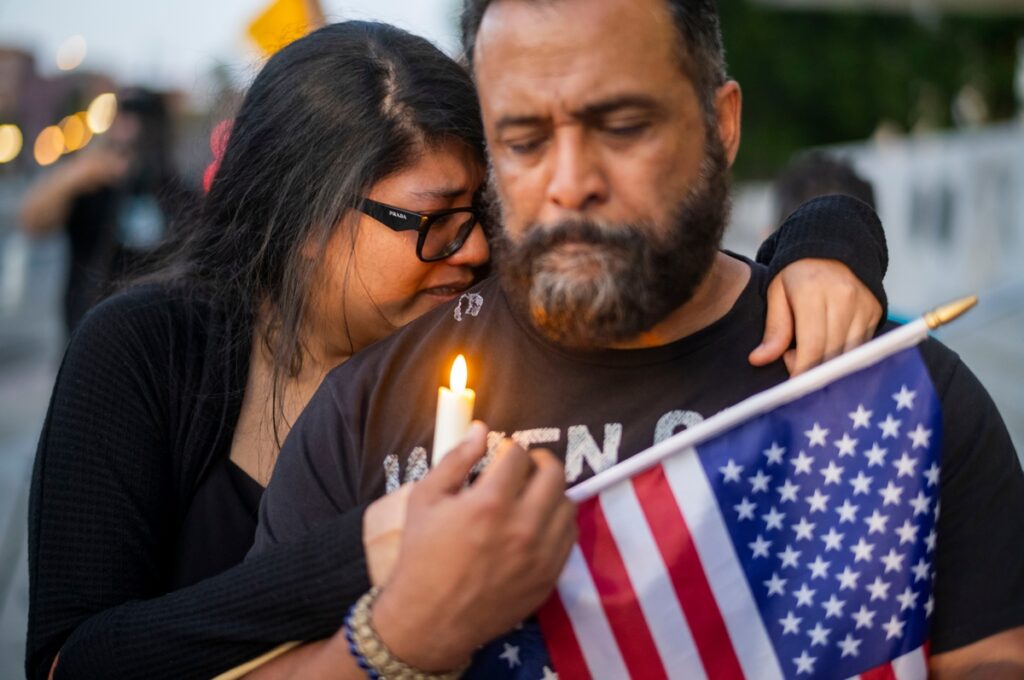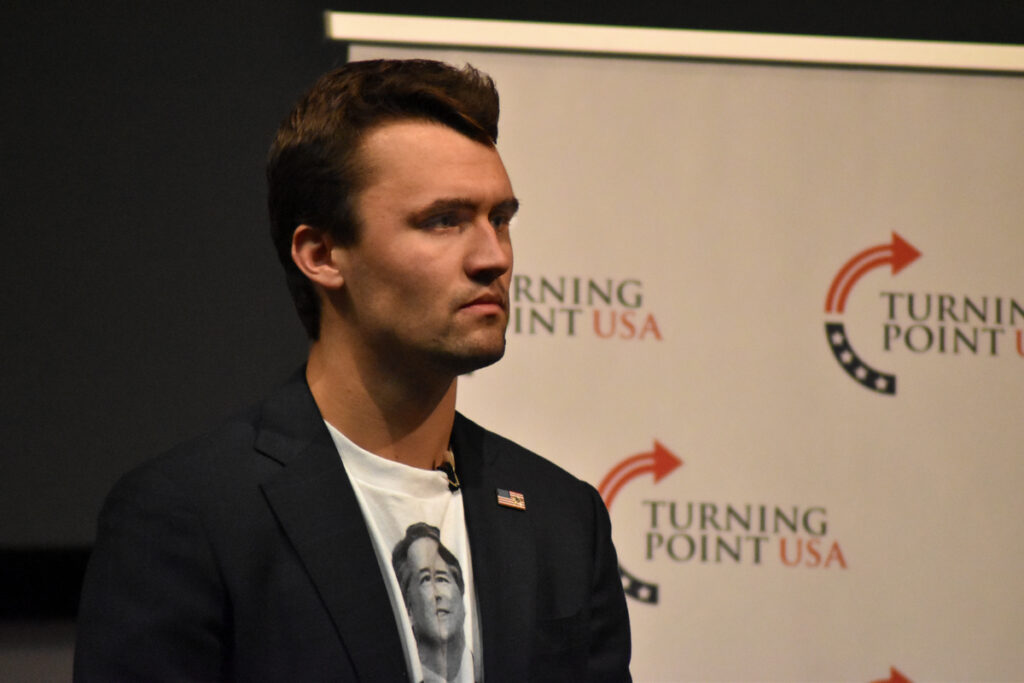What happened was not only the tragic end of a life, but a brutal confirmation of how deeply American society is trapped in its own divisions and cultures of hatred

GLOBAL ANALYSIS
by Žikica Milošević
The murder of Charlie Kirk at the University of Utah feels like a scene from an American film – until one realises it is not fiction. What happened was not only the tragic end of a life, but a brutal confirmation of how deeply American society is trapped in its own divisions and cultures of hatred. Whoever Kirk was, and whatever “fires he lit”, his killer “extinguished them with petrol”.
Silencing an idea with a bullet only makes it louder
Sower of Hate or Champion of Free Speech?
Charlie Kirk was anything but a neutral figure. As the founder and face of Turning Point USA, he built his career on a culture of confrontation. His speeches on university campuses had the air of rallies, with a clear divide between “us” and “them.” He was a hero of conservative youth, a preacher of the “return to Christian and family values,” but also a target of ridicule – and even hatred – in liberal circles. His rhetoric inspired some, provoked others, and rarely left anyone indifferent. He was someone labelled a “Christian fascist,” and his positions were often extreme and offensive to many communities (LGBTQ+, African Americans, those known in America as “liberals”), irritating and angering people. Enough (and reason enough) to silence him with a bullet? Absolutely not. It was a “disservice” to liberal America.
This is precisely why his death carries a double meaning. On the one hand, Kirk becomes a symbol – almost a martyr of conservative America, proof that today’s political battles can be paid for with one’s life. His followers will see the murder not as an attack on a man, but on the very idea of the America they envision. “Stopped on the path of Good by the forces of Evil,” his admirers who favour simple narratives will say. Is it realistic to think that such people exist? Oh yes – many! All the more so given that, alongside J.D. Vance, he was seen as one of the “future presidential hopefuls of America.”

On the other hand, some will argue that Kirk himself contributed to the climate in which violence is no longer unthinkable, through his speeches. Were his words fuel for further conflicts? Did he “dance” too close to the fire and eventually get burned? Perhaps he lit fires he should not have lit, but whoever tried to extinguish them with a single shot ended up pouring petrol on them – and has now opened Pandora’s box.
Answers to the questions about the righteousness of Kirk’s words and positions will not be easy to find, but society will inevitably continue to ask them. Kirk maintained that the right to bear arms was an absolute American right and that the victims of mass shootings were a necessary sacrifice to protect freedom. Is this irony of fate, or “karma” as the left says – that “he who lived by the sword died by the sword”? Others claim he was a “champion of free speech” and should be nominated for the Sakharov Prize.
To quote Sarajevo-based analyst Vuk Bačanović in his critique of Kirk’s positions: “If the Lord Christ had wished His community (the Church) to exist in any kind of ‘symphony’ with earthly empires – which are themselves nothing more than manifestations of fallen humanity – He would have, with the movement of a finger, killed the Pharisees, Pontius Pilate, and Emperor Tiberius, and Himself become an earthly ruler to whom everyone would bow unquestioningly. But the matter was the very opposite: God turned everything upside down and, in the form of the last ‘wretch,’ defeated the earthly empires and their fundamental philosophy – the monetisation of death, that is, the fear of death. In this sense, any Christianity that is not a vanguard against this Babylonian philosophy, which today is also called ‘Christian nationalism,’ is not authentic.” In other words, the creation of a “virtuous state” does not go hand in hand with the rhetoric of violence, with statements such as “empathy does harm” and the like.
Perhaps Kirk lit fires he should never have lit, but the one who tried to put them out with a single shot ended up dousing them in petrol – and has now opened Pandora’s box
Low-Intensity Civil War?
The bigger picture, however, goes beyond a single man. America has long been in a state of permanent culture war, where a political opponent is no longer simply someone with a different opinion but an enemy. For years, the rhetoric has oscillated between insult and demonisation, with social media amplifying the echo chambers. In such an atmosphere, moving from words to weapons no longer seems like a “quantum leap,” but rather a continuation of the logic of conflict – politics pursued by other means.
Liberal campuses, already under pressure, will become even more cautious, perhaps even more closed off, fearing new accusations and attacks. Public debates in America will become increasingly costly – not only in terms of money and security, but also in terms of risk. Freedom of speech will formally remain, but in practice it will be constrained by fear of what is spoken aloud.
It all recalls last year’s film Civil War, in which we see a deeply divided America, prone to violence reminiscent of the Yugoslav wars of 1991–2001. All of this has deep roots in an already polarised American society, where there are very few “in the middle,” very little reason, and little of the Middle Way preached by the Buddha – and ever-widening chasms between those on the left and those on the right. How has America reached the point where we are once again in the 1960s, with assassinations of public figures?
A New JFK, a New Martin Luther King… Only Inverted!
The timing could not have been worse: instead of a moment of silence, Congress erupted into a loud debate over everything – whether his death should be commemorated at all, whether now is the time for stricter gun laws – with open displays of disrespect for his passing. On social media, many are celebrating and mocking, while others threaten them that their laughter will be short-lived. Murals are being painted across the US of Iryna Zarutska, the “beautiful white blonde” Ukrainian refugee, senselessly massacred by an African American psychopath. This goes beyond mere crime or mental illness – many have seized the opportunity to stigmatise all African Americans and sanctify whites quietly. Movements like BLM and those advocating for trans rights are likely to suffer a setback.
Posts online highlight the contrast between Kirk’s killing – marked by quiet flower tributes reminiscent of Princess Diana’s death – and George Floyd’s murder, which sparked mass riots and looting, accompanied by captions like “We are not all the same!” It has been mentioned that the killer had a trans partner before the murder, and hatred has now spilt over onto that community as well. Everything is simmering. Sixty years later, right-wing America has its own JFK, its own Robert Kennedy, its own Martin Luther King – an idol who died at 31. Someone thought that silencing a “figure of hate” would silence the idea itself, but instead, we may see many of his “ideological heirs,” and I fear even more extreme ones. For them, his murder “proved he was right.” An explosive mix is brewing. It is not too late to stop America from turning into a runaway train, but it will require skill and restraint on both sides – something we are not currently seeing.
Quo Vadis, America?
From Serbia’s perspective, all of this seems like a continuation of the familiar American paradox: a country that sees itself as a bastion of democracy and freedom, yet increasingly resolves its internal disputes through violence. From the outside, it appears that America has grown tired of words and increasingly chooses the bullet and not over “greater issues” such as war and peace, but over questions of identity, gender politics, religion, and culture. Charlie Kirk was both a participant and a victim of this, caught in a highly complex mechanism of polarisation on the political and social scene – a mechanism that goes far beyond America itself.
The widening of divides and the disappearance of the “Middle Way” are characteristic of many countries that have allowed democratic aberrations and abandoned the Social Contract, as Rousseau called it – or, in other words, the social consensus: we all coexist and respect one another, more or less; no one overreaches too far, no one takes too much. Around the world, it feels as though everyone has suddenly started taking too much to finally realise their own visions of society as they imagined them. As Darko Rundek said: “Within us, time is changing, and everyone is once again ready to fight for the dream.” In his song “The Watchmen Are Coming,” Rundek foresaw the arrival of the 1990s and the many wars – from Tajikistan and Yemen to Somalia and Yugoslavia, as well as conflicts in Georgia, Moldova, Armenia, and Azerbaijan. And it feels as if such a new era is coming again. “Either my dream will become reality – or there will be nothing left of the world!” Too many people seem to have this sentence on their lips.
Outside of America, the question remains: how deeply will the world – dependent as it is on America’s cultural and political exports – feel the reverberations of this tragedy? And within America’s divided society, new icons are being created. In a twist of irony, the American right has been given its own Đinđić – “the young leader tragically cut down on his path to set the country right.” Instead of uniting, as it so desperately needs to, America has been left even more divided by this killing.